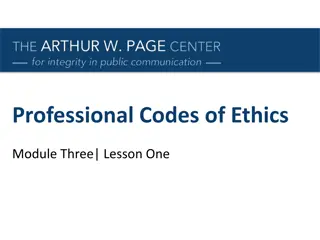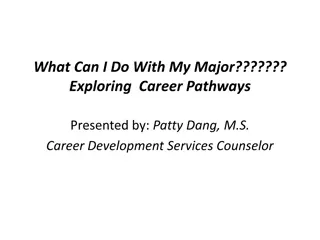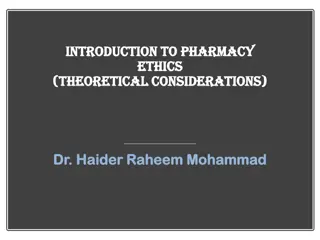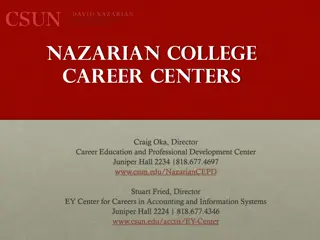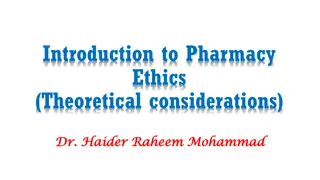Understanding Professional Ethics in Career Development
This educational module delves into personal, theoretical, and professional ethics, exploring potential conflicts between role morality and personal morality. Students will gain insights on applying ethical principles in their careers, understanding the role of professional codes of ethics, and resolving moral dilemmas effectively. Key topics covered include distinguishing between different ethics, justifying role obligations, and examining professional codes in various professions.
Download Presentation

Please find below an Image/Link to download the presentation.
The content on the website is provided AS IS for your information and personal use only. It may not be sold, licensed, or shared on other websites without obtaining consent from the author. Download presentation by click this link. If you encounter any issues during the download, it is possible that the publisher has removed the file from their server.
E N D
Presentation Transcript
Education for Justice (E4J) Integrity and Ethics Module 14: Professional Ethics
Agenda Understanding personal, theoretical, and professional ethics (45 minutes) Potential conflicts between role morality and personal morality (1 hour) Professional codes: aspirational and disciplinary (1 hour and 15 minutes)
Learning Outcomes Upon completion of this module students should be able to: Clearly distinguish between personal, theoretical, and professional ethics Think critically about ethical issues which are encountered first hand within a career, and apply personal, theoretical, and professional ethics to vexing moral decisions within specific professions Grasp the challenges posed by potential conflicts between role morality and personal morality, and consider ways of resolving those conflicts Understand the role of professional codes of ethics, the difference between aspirational and disciplinary codes of ethics, and how professional codes may apply in their career
Understanding personal, theoretical, and professional ethics Personal ethics Theoretical ethics Professional ethics Organizational culture
Potential conflicts between role morality and personal morality The concept of role morality o What is role ? o Conflict between personal & professional ethics Luban s four-step strategy for resolving questions of role morality o Justify the relevant societal institution, based on the moral good it does o Justify the professional s role, based on the structure of the institution o Justify the particular role obligation in question, by showing that the behaviour required is essential to that role o Justify the act demanded by the role, by showing that role obligations require the action
Class exercise Role morality
Professional codes: aspirational and disciplinary Purpose of Professional codes Professional ethics / Professional codes Aspirational / Disciplinary Examples of Professional codes
Core readings I BBC Ethics Guide. Lying. Available from http://www.bbc.co.uk/ethics/lying/lying_1.shtml Britz, Johannes (2013). Understanding Information Ethics. Information Ethics in Africa: Cross- Cutting Themes. African Centre of Excellence for Information Ethics. Available from http://www.africainfoethics.org/pdf/ie_africa/manuscript.pdf Illinois Institute of Technology, Center for the Study of Ethics in the Professions (2003). Language of professional ethics. Available from http://ethics.iit.edu/teaching/language- professional-ethics Illinois Institute of Technology, Center for the Study of Ethics in the Professions (2008). Professional ethics. Available from http://ethics.iit.edu/teaching/professional-ethics
Core reading II Luban, David (2007). Professional ethics. A Companion to Applied Ethics. R.G. Frey and Christopher Heath Wellman, eds. Malden, MA: Wiley-Blackwell Markkula Center for Applied Ethics (2017). Make your code of ethics matter. Available from https://www.scu.edu/ethics/focus-areas/campus-ethics/programs-for-students/student- government-ethics/resources/make-your-code-of-ethics-matter/make-your-code-of-ethics- matter.html Lichtenberg, Judith (1996). What are codes of ethics for? Codes of Ethics and the Professions. Margaret Coady and Sidney Bloch, eds. Victoria: Melbourne University Press














